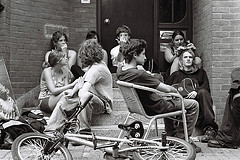The quality of parent-infant relationships can influence an adolescent’s social anxiety, according to a new study conducted by the University of Maryland, National Institute of Mental Health and the University of Waterloo.
The study noted that infants who are not securely attached to their parents can grow up to develop social anxiety problems, which is one of the most common psychiatric disorders among children and adolescents. About 5.5 percent of people between the ages of 15 and 18 suffer from the disorder, according to the study.
During the study, researchers studied 165 European-American, middle to upper-middle class babies at four months of age. At 14 months, researchers tested the toddlers by briefly separating them from their parents. Infants were then classified into secure and insecure attachment groups. Those who were securely attached would initiate contact with their parents after separation and would calm down had they been upset. Those with insecure attachments either ignored their parents or wanted to be physically close while being angry or upset.
The children’s behavioral inhibition was then noted at 14, 24, 48 and 84 months. Parents also completed surveys regarding their children’s behavior with new situations and strangers or peers. When the children became teenagers, the teens and their parents also completed a survey about their anxiety.
Teens who said they often felt nervous going to parties, dances and other places with they’d never been to with people they didn’t know well said they also felt nervous reading out loud, speaking or playing a sport. Children who were insecurely attached to their parents were inhibited through childhood and had higher levels of anxiety, especially socially, in adolescence. Boys were at most risk for social anxiety, the study found.
“Our study suggests that it is the combination of both early risk factors that predicts anxiety in adolescence, particularly social anxiety,” Erin Lewis-Morrarty, Ph.D., a research associate at the University of Maryland, said.
Source: Psych Central / Photo Credit: Flickr









